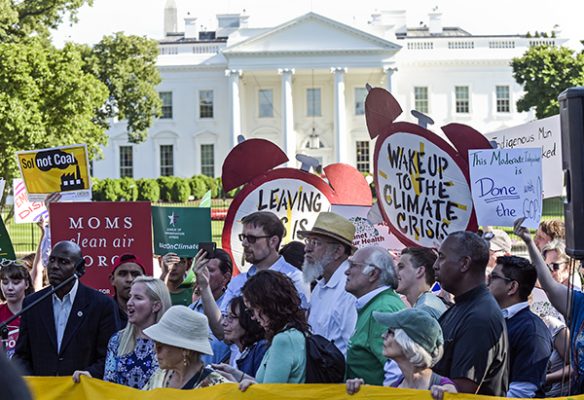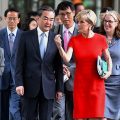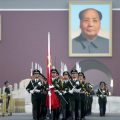
A number of nations have vowed to continue their efforts to keep the Paris climate agreement on track, saying the trend toward low carbon development is irreversible for all to achieve healthy growth, after President Donald Trump pulled the United States out of the pact on Thursday.
“The world should cherish the hard-won outcome of reaching the landmark agreement,” said Foreign Ministry spokeswoman Hua Chunying at a regular news briefing on Friday.
“China will strengthen cooperation with other parties and together turn pledges into actions.”
She said China has benefited from green transformation and will stick to its Paris pledges.
Her remarks were echoed by Miguel Arias Canete, the climate action and energy commissioner of the European Council, who also emphasized the importance of keeping promises to push the pact forward.
“The EU deeply regrets the unilateral decision by the Trump administration to withdraw the US from the Paris Agreement,” Canete said in a statement.
“We see the Paris Agreement and the low-carbon transition for what it is, the irreversible growth engine of our economies and the key to protecting our planet,” he said.
The United Nations described Trump’s decision as a “major disappointment for global efforts to reduce greenhouse gas emissions and promote global security”.
Criticism of Trump’s decision rolled in from blue-chip companies like Facebook, Apple, Ford Motor and Microsoft, while the response from fossil-fuel groups with the most to gain from a relaxation of US carbon emissions standards was muted.
Tesla CEO Elon Musk and Walt Disney CEO Robert Iger said they would leave White House advisory councils over Trump’s decision.
Some state governors and city mayors were quick to claim the mantle of US leadership in fighting climate change.
The officials said they collectively could show the international community that the United States remained committed to cutting the emissions that scientists blame for global warming.
Governors and analysts cited moves including California’s effort to get 100 percent of its electricity from renewable sources, northeast states’ potentially tightening maximum allowances for carbon, and Oregon working on measures to put a price on carbon.
The world largest economy now joins Syria and Nicaragua as one of only three countries to not be part of the Paris Agreement.
Trump said he decided to withdraw because the accord had given other countries an unfair advantage over US industry and destroyed US jobs.
Energy Foundation CEO Eric Heitz said Trump’s decision will harm the US economy and, most significantly, the rapidly growing clean energy sector, which employs 2.6 million people in the US.
Wang Yao, vice-president of China’s Green Finance Committee, said, “Whatever it brings to the US, the key thing now is to deal with challenges left by the withdrawal of one of the world’s largest emitters.”
Key challenges include who will take the leadership after the US leaves the pact, and who will fill the gap in funding that the US should have contributed to the Green Climate Fund, a mechanism to assist developing countries in climate adaptation, according to Wang.
Jo Leinen, a German member of the European Parliament, said Europe and China have understood the potentials of a low emission economy for jobs and growth, and the two sides will strengthen cooperation on climate change.


